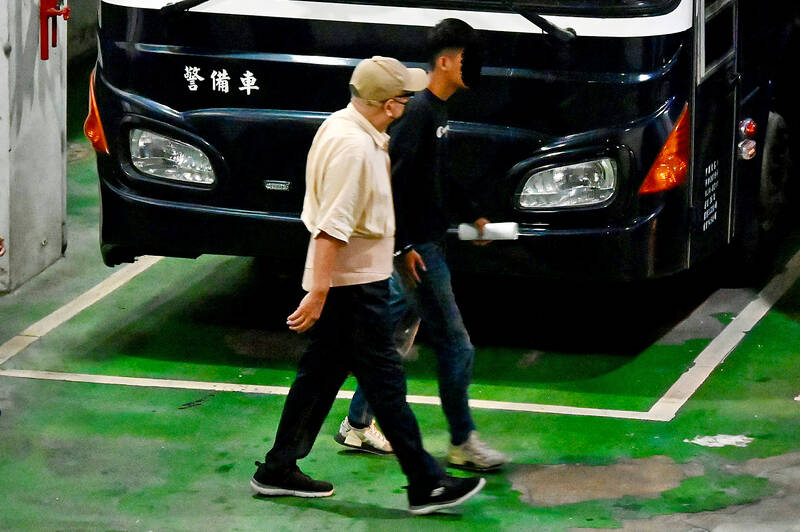Former Dingyue Development Corp (鼎越開發) president Chu Yea-hu (朱亞虎) has admitted paying bribes in connection to the Core Pacific City case, the Taipei District Court said, which granted prosecutors’ request late on Saturday night to have him detained and held incommunicado for suspected corruption.
The court late on Saturday evening also approved a request by the Taipei District Court to detain chief financial officer of the Taiwan People’s Party’s (TPP) presidential campaign Lee Wen-tsung (李文宗).
The two were among 10 defendants accused of corruption by allegedly giving preferential treatment to Core Pacific City Co (京華城) during TPP Chairman Ko Wen-je’s (柯文哲) tenure as Taipei mayor and expanding the floor area ratio (FAR) of the redevelopment project in 2020 to boost the value of the property.

Photo: George Tsorng, Taipei Times
Chu and Lee were summoned for questioning by Taipei prosecutors and the Agency Against Corruption taskforce earlier on Saturday during which Chu admitted to paying bribes to city officials, court records showed.
The court ordered Lee to be detained for allegedly taking bribes, although he denied the allegations against him when questioned, court records showed.
Other suspects were also questioned, including Core Pacific supervisor Chang Chih-cheng (張志澄) and Core Pacific Group legal affairs manager Chen Chun-yuan (陳俊源).
They were later released on bail of NT$2.5 million (US$78,894) and NT$1.5 million respectively.
Prosecutors said that Chu of Dingyue Development Corp, a subsidiary of Core Pacific Group (威京集團), and Lee played the role of “white glove” intermediaries to channel bribes between Core Pacific Group chairman Sheen Ching-jing (沈慶京) and Ko.
Prosecutors said Chu is facing bribery charges for contravening the Anti-Corruption Act (貪污治罪條例) and would be detained due to the high risk that he would flee abroad or collude on his testimony with other defendants.
Lee is facing charges of taking bribes and would be detained to prevent him from tampering with evidence or colluding on his testimony with other defendants.
Additional reporting by Chen Tsai-ling and CNA

TRUST: The KMT said it respected the US’ timing and considerations, and hoped it would continue to honor its commitments to helping Taiwan bolster its defenses and deterrence US President Donald Trump is delaying a multibillion-dollar arms sale to Taiwan to ensure his visit to Beijing is successful, a New York Times report said. The weapons sales package has stalled in the US Department of State, the report said, citing US officials it did not identify. The White House has told agencies not to push forward ahead of Trump’s meeting with Chinese President Xi Jinping (習近平), it said. The two last month held a phone call to discuss trade and geopolitical flashpoints ahead of the summit. Xi raised the Taiwan issue and urged the US to handle arms sales to

A magnitude 5.6 earthquake struck off the coast of Yilan County at 12:37pm today, with clear shaking felt across much of northern Taiwan. There were no immediate reports of damage. The epicenter of the quake was 16.9km east-southeast of Yilan County Hall offshore at a depth of 66.8km, Central Weather Administration (CWA) data showed. The maximum intensity registered at a 4 in Yilan County’s Nanao Township (南澳) on Taiwan’s seven-tier scale. Other parts of Yilan, as well as certain areas of Hualien County, Taipei, New Taipei City, Taoyuan, Hsinchu County, Taichung and Miaoli County, recorded intensities of 3. Residents of Yilan County and Taipei received

Taiwan has secured another breakthrough in fruit exports, with jujubes, dragon fruit and lychees approved for shipment to the EU, the Ministry of Agriculture said yesterday. The Animal and Plant Health Inspection Agency on Thursday received formal notification of the approval from the EU, the ministry said, adding that the decision was expected to expand Taiwanese fruit producers’ access to high-end European markets. Taiwan exported 126 tonnes of lychees last year, valued at US$1.48 million, with Japan accounting for 102 tonnes. Other export destinations included New Zealand, Hong Kong, the US and Australia, ministry data showed. Jujube exports totaled 103 tonnes, valued at

BIG SPENDERS: Foreign investors bought the most Taiwan equities since 2005, signaling confidence that an AI boom would continue to benefit chipmakers Taiwan Semiconductor Manufacturing Co’s (TSMC, 台積電) market capitalization swelled to US$2 trillion for the first time following a 4.25 percent rally in its American depositary receipts (ADR) overnight, putting the world’s biggest contract chipmaker sixth on the list of the world’s biggest companies by market capitalization, just behind Amazon.com Inc. The site CompaniesMarketcap.com ranked TSMC ahead of Saudi Aramco and Meta Platforms Inc. The Taiwanese company’s ADRs on Tuesday surged to US$385.75 on the New York Stock Exchange, as strong demand for artificial intelligence (AI) applications led to chip supply constraints and boost revenue growth to record-breaking levels. Each TSMC ADR represents